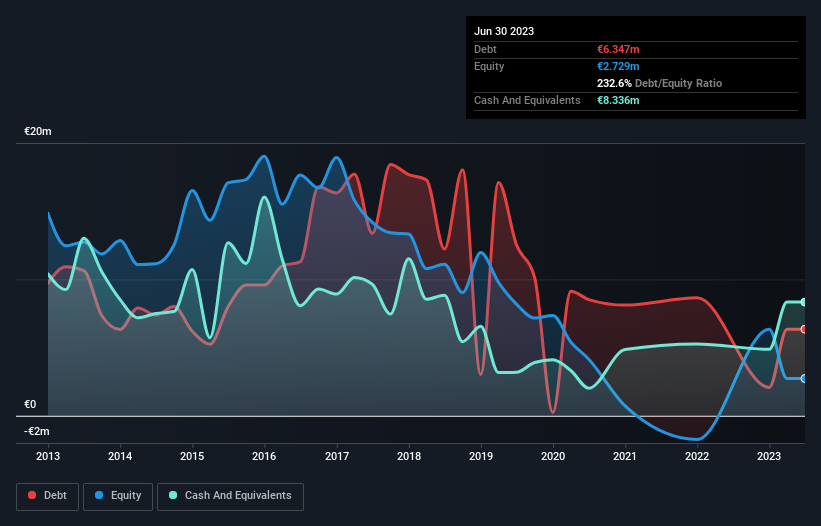Howard Marks put it nicely when he said that, rather than worrying about share price volatility, 'The possibility of permanent loss is the risk I worry about... and every practical investor I know worries about.' So it seems the smart money knows that debt - which is usually involved in bankruptcies - is a very important factor, when you assess how risky a company is. We note that Fidia S.p.A. (BIT:FDA) does have debt on its balance sheet. But the more important question is: how much risk is that debt creating?
Why Does Debt Bring Risk?
Generally speaking, debt only becomes a real problem when a company can't easily pay it off, either by raising capital or with its own cash flow. Ultimately, if the company can't fulfill its legal obligations to repay debt, shareholders could walk away with nothing. While that is not too common, we often do see indebted companies permanently diluting shareholders because lenders force them to raise capital at a distressed price. Having said that, the most common situation is where a company manages its debt reasonably well - and to its own advantage. When we examine debt levels, we first consider both cash and debt levels, together.
See our latest analysis for Fidia
How Much Debt Does Fidia Carry?
As you can see below, Fidia had €6.35m of debt at June 2023, down from €8.65m a year prior. However, it does have €8.34m in cash offsetting this, leading to net cash of €1.99m.

A Look At Fidia's Liabilities
Zooming in on the latest balance sheet data, we can see that Fidia had liabilities of €29.4m due within 12 months and liabilities of €7.77m due beyond that. On the other hand, it had cash of €8.34m and €6.95m worth of receivables due within a year. So its liabilities outweigh the sum of its cash and (near-term) receivables by €21.9m.
This deficit casts a shadow over the €6.84m company, like a colossus towering over mere mortals. So we'd watch its balance sheet closely, without a doubt. After all, Fidia would likely require a major re-capitalisation if it had to pay its creditors today. Given that Fidia has more cash than debt, we're pretty confident it can handle its debt, despite the fact that it has a lot of liabilities in total. There's no doubt that we learn most about debt from the balance sheet. But it is Fidia's earnings that will influence how the balance sheet holds up in the future. So if you're keen to discover more about its earnings, it might be worth checking out this graph of its long term earnings trend.
In the last year Fidia's revenue was pretty flat, and it made a negative EBIT. While that hardly impresses, its not too bad either.
So How Risky Is Fidia?
Although Fidia had an earnings before interest and tax (EBIT) loss over the last twelve months, it generated positive free cash flow of €2.3m. So although it is loss-making, it doesn't seem to have too much near-term balance sheet risk, keeping in mind the net cash. Given the lack of transparency around future revenue (and cashflow), we're nervous about this one, until it makes its first big sales. To us, it is a high risk play. There's no doubt that we learn most about debt from the balance sheet. However, not all investment risk resides within the balance sheet - far from it. Case in point: We've spotted 3 warning signs for Fidia you should be aware of, and 1 of them is a bit unpleasant.
When all is said and done, sometimes its easier to focus on companies that don't even need debt. Readers can access a list of growth stocks with zero net debt 100% free, right now.
New: AI Stock Screener & Alerts
Our new AI Stock Screener scans the market every day to uncover opportunities.
• Dividend Powerhouses (3%+ Yield)
• Undervalued Small Caps with Insider Buying
• High growth Tech and AI Companies
Or build your own from over 50 metrics.
Have feedback on this article? Concerned about the content? Get in touch with us directly. Alternatively, email editorial-team (at) simplywallst.com.
This article by Simply Wall St is general in nature. We provide commentary based on historical data and analyst forecasts only using an unbiased methodology and our articles are not intended to be financial advice. It does not constitute a recommendation to buy or sell any stock, and does not take account of your objectives, or your financial situation. We aim to bring you long-term focused analysis driven by fundamental data. Note that our analysis may not factor in the latest price-sensitive company announcements or qualitative material. Simply Wall St has no position in any stocks mentioned.
About BIT:FDA
Fidia
Designs, manufactures, and sells high speed milling systems, numerical controls, milling heads, and software systems.
Moderate risk with mediocre balance sheet.
Market Insights
Community Narratives



